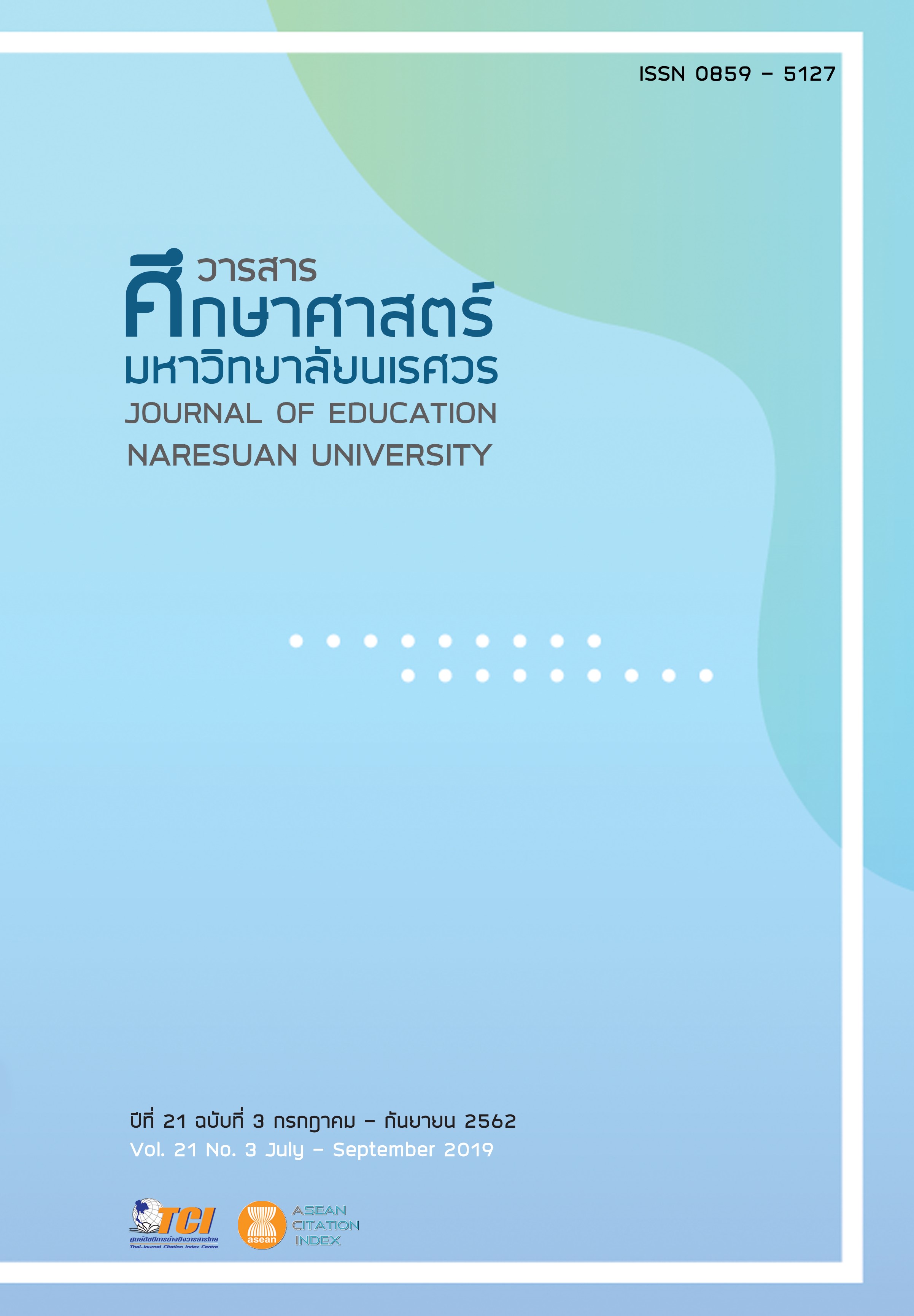การพัฒนากิจกรรมการเรียนรู้ที่เน้นการสร้างความรู้ด้วยตนเองเพื่อเสริมสร้างความสามารถในการแก้ปัญหาทางคณิตศาสตร์ สำหรับนักเรียนชั้นมัธยมศึกษาปีที่ 1 (THE DEVELOPMENT OF LEARNING ACTIVITIES BASED ON CONSTRUCTIVISM TO ENHANCE MATHEMATICS PROBLEMS SOLVING ABILITY FOR GRADE 7 STUDENTS)
Main Article Content
Abstract
การวิจัยครั้งนี้ มีวัตถุประสงค์ ดังนี้ 1) เพื่อสร้างและหาประสิทธิภาพของกิจกรรมการเรียนรู้ที่เน้นการสร้างความรู้ด้วยตนเอง เพื่อเสริมสร้างความสามารถในการแก้ปัญหาทางคณิตศาสตร์ สำหรับนักเรียนชั้นมัธยมศึกษาปีที่ 1 ตามเกณฑ์ 75/75 2) เพื่อเปรียบเทียบความสามารถในการแก้ปัญหาทางคณิตศาสตร์ก่อนเรียนและหลังเรียนของนักเรียน 3) เพื่อศึกษาความพึงพอใจของนักเรียนที่มีต่อการเรียนด้วยกิจกรรมการเรียนรู้ที่เน้นการสร้างความรู้ด้วยตนเอง วิธีดำเนินการวิจัยใช้กระบวนการของการวิจัยและพัฒนามี 3 ขั้นตอน ดังนี้ ขั้นตอนที่ 1 การสร้างและหาประสิทธิภาพกิจกรรมการเรียนรู้ ผู้วิจัยดำเนินการสร้างกิจกรรมการเรียนรู้ 4 กิจกรรม นำไปทดลองใช้กับนักเรียนชั้นมัธยมศึกษาปีที่ 1 เพื่อหาประสิทธิภาพของกิจกรรมการเรียนรู้ตามเกณฑ์ 75/75 เครื่องมือที่ใช้ในการวิจัย ได้แก่ กิจกรรมการเรียนรู้ที่เน้นการสร้างความรู้ด้วยตนเอง และแบบทดสอบความสามารถในการแก้ปัญหาทางคณิตศาสตร์ สถิติที่ใช้ในการวิเคราะห์ข้อมูล คือ ค่าเฉลี่ย ส่วนเบี่ยงเบนมาตรฐาน หาประสิทธิภาพโดยใช้สูตร E1/E2 ขั้นตอนที่ 2 การทดลองใช้กิจกรรมการเรียนรู้ที่เน้นการสร้างความรู้ด้วยตนเอง กลุ่มตัวอย่าง คือ นักเรียนชั้นมัธยมศึกษาปีที่ 1 ที่กำลังศึกษาอยู่ในภาคเรียนที่ 2 ปีการศึกษา 2559 โรงเรียนบ้านท่าช้าง จังหวัดเพชรบูรณ์ จำนวน 15 คน สถิติที่ใช้ในการวิเคราะห์ข้อมูล คือ ค่าเฉลี่ย ค่าส่วนเบี่ยงเบนมาตรฐาน และทดสอบความมีนัยสำคัญทางสถิติ t – test แบบ Dependent ขั้นตอนที่ 3 การศึกษาความพึงพอใจของนักเรียนที่มีต่อกิจกรรมการเรียนรู้ที่เน้นการสร้างความรู้ด้วยตนเองโดยใช้แบบประเมินความพึงพอใจ ผลการวิจัย พบว่า 1) กิจกรรมการเรียนรู้ที่เน้นการสร้างความรู้ด้วยตนเองเพื่อเสริมสร้างความสามารถในการแก้ปัญหาทางคณิตศาสตร์ สำหรับนักเรียนชั้นมัธยมศึกษาปีที่ 1 มีกระบวนการการเรียนรู้ 4 ขั้นตอน คือ 1) ขั้นเสนอสถานการณ์ปัญหา 2) ขั้นสร้างความรู้สึกอยากแก้ปัญหา 3) ขั้นลงมือแก้ไขปัญหากิจกรรม และ 4) ขั้นประเมินผลกิจกรรม และมีประสิทธิภาพ E1/ E2 เท่ากับ 76.17/78.89 เป็นไปตามเกณฑ์ที่ตั้งไว้ 75/75 2) นักเรียนมีความสามารถในการแก้ปัญหาทางคณิตศาสตร์หลังเรียนสูงกว่าก่อนเรียนอย่างมีนัยสำคัญทางสถิติที่ระดับ .01 และ 3) นักเรียนมีความพึงพอใจต่อกิจกรรมการเรียนรู้ที่เน้นการสร้างความรู้ด้วยตนเองโดยรวมในระดับมากที่สุด
THE DEVELOPMENT OF LEARNING ACTIVITIES BASED ON CONSTRUCTIVISM TO ENHANCE MATHEMATICS PROBLEMS SOLVING ABILITY FOR GRADE 7 STUDENTS
The purposes of this research were 1) to construct and identify the efficiency of learning activities based on constructivism to enhance Mathematics problems solving ability for grade 7 students using the criteria of 75/75, 2) to implement learning activities based on constructivism, and 3) to study the satisfaction students of learning activities based on constructivism for grade 7 students. The research and development procedures were divided into 3 steps as follows: Step one inspected its quality by 3 experts to examine the appropriation then implemented in Mathayomsuksa 1 students to define the efficiency of 75/75. The data were analyzed by
the analysis of mean, standard deviation and E1/E2. Step two was to using constructivism to enhance mathematics problems solving ability for grade 7 students learning to compare the student competence before and after with learning activities based on constructivism. The sample group was 15 students in Mathayomsuksa 1 students at the second semester of the academic year 2016 at Banthachang School, Phetchaboon Province. The data were analyzed by mean and t–test dependent. Step three was study the students satisfaction of learning activities based on constructivism. Using satisfaction evaluating and analyze information by defining mean and standard deviation. Research findings were as follows: 1) learning activities based on constructivism to enhance mathematics problems solving ability for grade 7 students contains with fourth steps; the first step was proposals for problem situations, activities. The second step was to create a sense of problem solving. The third step was to solve problems, and the fourth step was activity evaluation. The efficiency value was at 76.17/78.89. 2) The competence on mathematics problems solving ability in the posttest was higher than that of the pretest with the statistical level of .01. Step three the students had the highest level of satisfaction toward learning activities based on constructivism.
Article Details
The owner of the article does not copy or violate any of its copyright. If any copyright infringement occurs or prosecution, in any case, the Editorial Board is not involved in all the rights to the owner of the article to be performed.
References
2. Jaiprong, C. (2011). A mathematics instructional activities adapting and applying a variety of problem-solving strategies to enhance ability to solve mathematical problems on functions for Mathayomsuksa IV students (Master thesis). Bangkok: Srinakharinwirote University. [in Thai]
3. Klomim, K., Namnak, C., Kaewurai, W., & Thumrongsotthisakul, W. (2014). A development of learning model based on constructivist theory of a scaffolding to enhance on mathematic problem solving skill for lower for the Mattayomsuksa 1. Journal of Education Naresuan University, 16(2), 123-139. [in Thai]
4. Phuudom, J. (2001). The development of mathematics-focused instructional models (Doctoral dissertation). Bangkok: Srinakharinwirote University. [in Thai]
5. Pipitkun, Y. (2002). Teaching mathematics. Bangkok: Chulalongkorn University. [in Thai]
6. The Institute for the Promotion of Teaching Science and Technology. (2008). Mathematical skills and processes. Bangkok: Charoen Printing. [in Thai]


